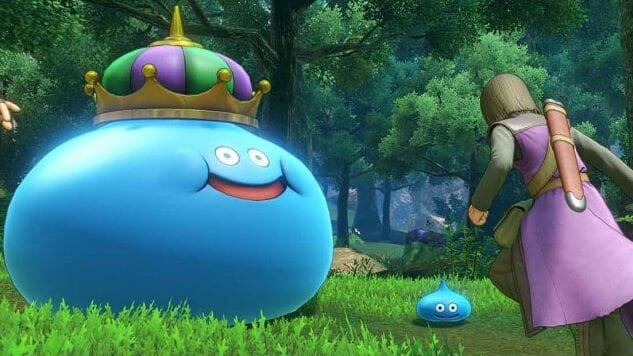Dragon Quest XI Struggles to Let Go of the Past

When I first started Dragon Quest XI: Echoes of an Elusive Age I wasn’t entirely sure what to expect. Other recent games in the series have always felt like they lagged behind other JRPGs out there, opting to stick to something more traditional and archaic instead of trying to experiment within the confines of the genre. While steps seem to have been taken to bring the western release of this 2017 title into the fold of modern day JRPGs, it’s clear that the series’s longstanding history still holds a significant amount of sway, leaving it at odds with its own legacy.
Dragon Quest XI opens with the usual plot points. You play as a child chosen by fate to save the world from darkness. It’s not particularly ground-breaking storytelling, but it serves its purpose of getting you up and out into the great wide world. Eventually the game’s narrative begins to take center stage. This is a big game spanning anywhere between 70 to 100 hours, and there’s a meaty amount of story to get stuck in that stretches all across the world of Erdrea. While the main protagonist is mute throughout the game, the companions you meet along the way have no problems speaking their mind, thanks in part to the English voice acting that has been added to the western release. It is a little grating however that the voices seem to have been plucked from a hat of different accents and dialects as some sort of misguided way to highlight that each character comes from a different background.
The companions that accompany you on your journey make up the traditional cast of adventurers—from the lovable street-rat rogue to the wise old sage, all the regulars are here. Fortunately, most of the characters have a bit more depth to them than just acting as walking templates, and as the story progresses, each companion gets a good chunk of time dedicated to exploring where they come from and why they’re willing to follow the hero on his quest. With that in mind, there’s something to be said for Sylvando, the flamboyant circus performer you meet early on in the game. He’s witty, brave, and full of joy, and while his sexuality is not specifically defined in game, it remains ambiguous throughout. While the inclusion of more diverse characters should be celebrated, it’s difficult to shake the feeling that the game is using the implication of his sexuality as comedic relief in some scenes, often making him out to be the butt of the joke by over exaggerating his behaviour as the stereotypical effeminate persona that regularly appears in Japanese media to illustrate gay men. In the wake of the anti-LGBT controversy surrounding the game’s composer Koichi Sugiyama, the way Sylvando is handled in Dragon Quest XI leaves a particularly sour taste. That’s a shame, as he is one of the best characters you’ll meet throughout the story.

-

-

-

-

-

-

-

-

-

-

-

-

-

-

-

-

-

-

-

-

-

-

-

-

-

-

-

-

-

-

-

-

-

-

-

-

-

-

-

-








































